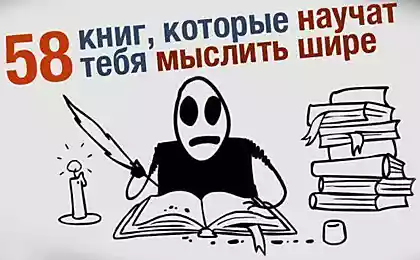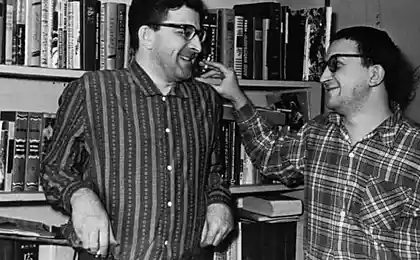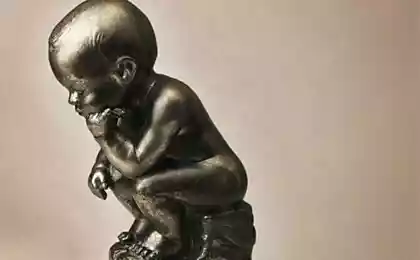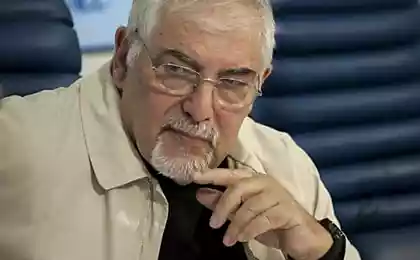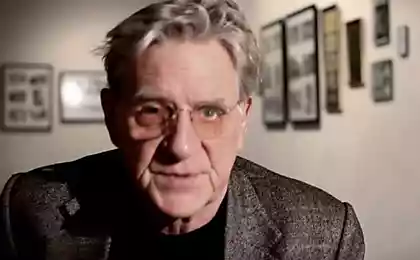861
Happiness for all. nothing
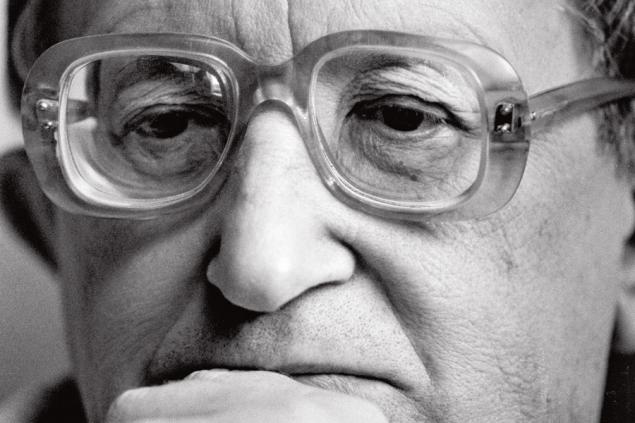
Indeed, the Strugatsky brothers - more than the writers. They are not about literature, or, more precisely, not only about literature. No wonder the philosopher Alexander Piatigorsky in a private conversation, mentioned that they only reflect on the problems of the second half of the twentieth century. Anyway, it is the language of our culture brothers Strugatsky past half century often put their "accursed questions". And if we now have the remnants of a general outlook and ideology, it can only describe it in their own language and the experience of those who build their lives with the help of roles and situations designed them
-I Could not participate in the construction of "Noon Universe". But I can not omit the hands. Not yet evening! Monday begins on Saturday! - As a teacher and marketer Lolita Volkova responded to our question about how different people do themselves and do things based on the Strugatsky books. So it works any sufficiently powerful ideology: Scientists experimenting in NIICHAVO, intelligence agencies and the conspirators were playing KOMKON, Vyacheslav Glazichev sought and found in every city or region progressors, the reformers took the Soviet Union for the planet Saraksh
. "Strugatsky were really for me is much more than just writers ... their books largely shaped the world, standards of conduct, purpose in life. It's funny, but I do remember exactly what was determined to understand the issues of the economy and the causes of inflation, having read the final part of "Inhabited Island". There Wanderer says Maxim: "Do you realize that inflation in the country? Do you even understand what inflation? "I wanted to be a fool and understand. Then for the first time I began to look for a special book on the economy ", - wrote Gaidar in his book" Days of defeats and victories »
. The irony is that the very main reformer (if you look at external results) played more as a benevolent Maxim, and not as a wise Wanderer - on the ruins of a tyrannical Center was not slow to appear hyperinflation with all its new suffering of the people liberated from the dictatorship. But as always, in the world of the Strugatsky brothers commandments predictions come true, and the answers are not as strong as their own "worlds". Whichever choice you make, it turns out that its effects have been described in any of the book you want "the best" or not. Strugatsky not about the commandments and prescriptions, but about the dialectical complexity of the most important decisions in life.
Philosophical power of parables, probably comes from the fact that the writers who have grown up in the faith in communism and disappointed in him, were able to describe the most complex problem situations of modern man. Anyone - not only to the Soviet. Human freedom - this is a problem, and not only in relation to the natural world, but also to the world of superhuman social experiment; not only the horrors of savagery, but also to the horrors of progress.
When Boris Strugatsky died, many have begun to complain about that too much, and vital, he nedosprosili (see. Recent interview on p. 32). But it seems that "dosprosit" was impossible. The fact that all answers and comments to the books are interesting, but still the most important thing - these are questions. Strugatsky books as a universal computer game, or rather, the game of life: the authors give only the coordinates for the choice, but the choice - for you. Think out and finish the reader has to. That is why we are analyzing not "creativity Strugatsky," and the world and the culture in which we live.
With the help of those who agreed to talk to us about how life used in the Strugatsky worlds, we have compiled a Top 10 paradoxical role-playing situations, describing the space of modern Russian (Soviet) of practical philosophy to the extent that she is still alive.
< br> 1. Vs Forest Management Reality Strugatsky
"Snail on the Slope" - a world of struggle "natural" and "artificial" life, with both sides desperate. Above the cliff is situated on forest management matters under the cliff - actually forest. Management - Administrative world of absurdity. Once its existence seems to have been a civilizing sense, but degenerated into an imitation of activity, supported by the flow of orders, reaching up to the abolition of the second law of thermodynamics in the decision-making procedure. Forest - the world of biological absurdity. This is no ordinary forest, and not even the jungle: it found the jumping trees, edible earth-ghouls biorobots ravening the local women ... women subordinated to Forest, reproducing by parthenogenesis and leading the genocide of Aboriginal men. The management comes linguist Pepper, who hopes to get into the forest, to discover a new world. And of Forests Management is already almost lost the ability to logic Candide - a former biologist, the crashed helicopter and adopted in one of the aboriginal villages
. In other books Strugatsky contradiction between the "natural" wild life management and social experiment is not so hopeless, but you can save yourself, if you are not part of the system and be able to walk the boundaries of the worlds.
Quotes
"This is not the head chooses. It chooses heart. : Laws are not good or bad, it is morality. But I was not out of morals! If I picked up the friend, cured and caressed would would take me as his, regret would be - well, then I would probably easily and naturally took the side of progress, and the lame, and all these villages would have been for me an unfortunate relic, which is too long potter ... »
"In view of the above are invited to further consider the manifestations of all kinds of accidents and irregularities contrary to the ideal of organization, and the implication to accidents (probabilitnost) - as a criminal act" ( "Snail on the Slope»)
. In our reality
We have seen how the idea of the total degeneration of "artificial" control (later the USSR), and natural ideas, "natural" forests -. To market 90
Personal experience
"" Snail on the Slope "- is in some sense a guide for decision-making and committing actions on the border of rational and irrational. Strugatsky has repeatedly addressed this topic, answers and prescriptions were not given, but the fact that we managed to speak to me very significant "- Shashi Martynova, CEO of online bookstores Magic Bookroom
2.. Father vs mentor Reality Strugatsky
The pedagogical utopia - one of the foundations of the world Strugatsky. Ideally, future children at an early age should be educated in special boarding schools. Teachers thus possess some high education theory (what is this, Strugatsky not really explained). In more complex things ( "The Ugly Swans", "Burdened by evil") image of the teacher comes into conflict with the image of a parent. The theme of fathers and children in the Strugatsky generally very traumatic. In "The Ugly Swans" children together with their mentors, slimy first isolated from parents in a leper colony, and then actually occupy the city and begin to build a new world.
Quotes
"- Munichka! Munichka! Munichka! Munichka my! Munichka!
- Let me go! Yes, let me as you! I have a daughter there.
- The CRC-p-rov, teeth will tear
! - Yeah, we can see quite shit started when relatives of the children have gone to infect ... Come on, they themselves are gone, nobody was driving force ... "(" The Ugly Swans »)
. "- Were men, youth and children on Earth. There were millions and millions of them here Eureka and Zhilin felt can be great to help them, at least some of them. No matter where. At the boarding school. Or in the factory club. Or, in the House of Pioneers. Help them come to life, help to find themselves, to define their place in the world, just want to learn a lot, learn to want to work excitedly "(" Fellows »).
In our reality
This is a terrible and very painful conflict. On the one hand, the legal mother and father, family values, parental duty. On the other - according to the laws of psychology there is separation from the parents of a teenager and becoming more important figure of the "significant adult" for him. From him he learns much social norms, profession, ideology. And above it all - a great utopia (as the best boarding schools for gifted children, or British School, from which decommissioned Hogwarts). And this educational utopia is and mirror dystopia - a tyrannical model of creation of the "new man»
. Personal experience
"Under the pressure of the images of" The Ugly Swans "I became more attentive to genetics, and took up a lot of psychogenetics a corrected. Course lectures pedantropologii so great was different from the previous benefits. I made a concession of biological heredity. Before I had a family history of cultural and historical. He began to learn the game of genetics with the environment. And in "The Ugly Swans" and "Beetle", and the heap of small stories they have shown: the birth of the mortgaged program can not be changed. As for the conflict between the parents and teachers, I was not paying attention to what is now regret this conflict. In fact, winning is always one of the teachers, who together with the child resides whole chunks of life ... I mean, it is important to not affect the baby, and with it, to suffer, cry, laugh and learn "(Professor Boris Bim-Bad, academician RAO) .
3. Surgeons vs therapists Reality Strugatsky
Progressor - the most attractive images of the Strugatsky brothers. Most of the surveyed admit that they compare themselves primarily with Don Rumatoy of "Hard to Be God" and other progressors - talking about it, and former dissidents and government officials, and academics, and rescuers
. Among the wildness and ignorance comes the messenger wonderful world of the future. He sometimes does not even know how to live so stupid and horrible. It is necessary to fix everything. And here the problems begin. Is it possible to intervene in the course of history? Can I go in one jump from savagery to civilization? Is it enough just to free people from tyranny and give them the freedom to choose? A Strugatsky not how to do - there is no general recipe - and that it is possible and necessary to think. They dismantled almost all the possible scenarios of a complex political and historical choice.
Quotes
"Don Kondor was staring at him, pursing her lips.
- You do not like you, Anton, - he said in Russian
. - I also do not like it much, Alexander, - said Rumata. - I do not like that we tied the hands and feet of the very formulation of the problem. I do not like what she called a problem Beskrovnyi Impact. Because in my terms is scientifically justified inaction ... I know all your objections! And I know the theory. But there are no theories are typically fascist practices, animals are continually killing people! Here are all useless. Knowledge is not enough, and the price of gold is losing because he was late.
- Anton, - said Don Kondor. - Do not get excited. I believe that the situation in Arkanar quite exceptional, but I am convinced that you do not have any constructive suggestions "(" It's hard to be god »).
In our reality
Progressors consider themselves easily, saying, I am the only one enlightened, and people around the wild. Home Strugatsky metaphor, like any real thing is dangerous. Progressors considered themselves Democrats, and in the late '80s, and the communists in the early' 90s (by the way, the assault zombie tower of "Inhabited Island" tragically embodied in the assault "Ostankino" in October 1993). Progressors full of self-confidence and in high offices, and at meetings. But Strugatsky books give a more complex and interesting matter than simple arrogance "enlightened" elite. For example, you feel yourself in a situation Earthlings are working on progressors from other worlds ( "Beetle in the Anthill»).
Personal experience
"I identify with Don Rumata especially in times underground" anti-Soviet "activities (1977-1982), but now part (" the noble Don Rumata enemy in the rear "). It is no coincidence communicate and make friends with the company that bears the proud name of "Progressor". During operation, the Deputy Minister (1991-1993) have an association with chapters about the management of the "Snail on the Slope." In the same book - Candide with his painful efforts to understand what kind of society in which to live has fallen. Another responsibility of the theme, the theme of limits and forms of intervention in the lives of others. Subject need to know what you want to change. But first of all, again, Candide: "Progress is morality. But I was not out of morals' "(Paul Kudyukin, former dissident, now a professor of the Higher School of Economics and a consultant" Progressor "group).
4. Creation vs people Reality Strugatsky
"Over a billion years before the end of the world." Soviet Leningrad 70s. Apartment Malianov astrophysics, studying the interaction of stars and diffuse matter. Pure science, man enthusiastically wrote a formula. And strange things start to happen that are with him to keep him from working: phone calls, suicide neighbor of Malianov murder charge and investigator with aberrations. Very soon it becomes clear that such a strange and terrible things happen with a few of his acquaintances scientists. Brainstorm they assume supercivilization intervention, which for some reason does not want the development of civilization and the Earth "prohibited" prospective studies. Then there is a more natural hypothesis resists the universe itself, as these billions of years of research could lead to his death. Selection:. Stop or continue, and a choice of single
Quotes
"After all, the man is very unpleasant to realize that he really is not what always appeared before Me. He wants to stay as he was all his life, and this is impossible if kapituliruesh. That's it and you have to ... And still, there is a difference. In our century are shot because ashamed before the other - to society, to your friends ... And in the last century fought a duel because they were ashamed of ourselves. You see, in our time, for some reason, it is believed that man himself always agree "(" For a billion years before the end of the world »).
In our reality
In Soviet times, it was believed that the Strugatsky in "Over a billion years before the end of the world" was given intellectual metaphor of choice - to defend the truth and to surrender to the state. Maybe ... but got metaphor for life in general, life as a thriller. Life - a terrible event, and there will always be forces greater than man in the world. Especially if it is something actively doing, not drifting. The simplest example - career: to make it successful and to preserve their "I" ... Example harder: an incurable disease, or its relatives. Incidentally, this is precisely an example from the book: Malianov broke down on the son's illness. As always, the Strugatsky's no right answer to the question, to give to the existential pressure or not. But this book has done a lot more resistant.
Personal experience
"In 2006-2007, there were many with me, both external and internal events, after which my point of view on issues of" supernatural "has changed significantly ... Being more or less normal, I bought a few months a lot of experience of visions, voices, periods when parts of me do not obey my body, and many incredible coincidences. Almost from the beginning, I discovered that many of these events I can control ... At such times, very helpful idea that we need to continue to fight because of that, even to a small extent, depends on it, in which the spiritual world will live today's children. Now, thinking about what happened to me at that time, I often think of the Strugatsky novel "Over a billion years before the end of the world." I went back to the math at the end of 2007 "(Vladimir Provincial, mathematician, winner of the Fields Medal, a professor at Princeton).
5. People vs supermen Reality Strugatsky
In humans, there was a mutation allowing technology to make of man the superman: eternal, sverhumnogo, with incredible abilities. Unfortunately, the rare mutation - only one per 100 thousand can become a superman, Luden. Lyudeny secretly taken "their" among the people, then Kammerer, Head of PE KOMKON-2, exposes them - Progressor, rescued Saraksh, it is "below" Luden. Nothing wrong with a few hundred people supermen do not want to, but they are bored with them - both annoying and dumb children. Begin personal tragedies, broken family, friendship.
Quote
"- Mankind will be divided into two unequal parts along parameters unknown to us, a smaller part of it by force, and forever will overtake great, and it come to pass by the will and skill supercivilization, strongly alien to humanity" ( "The Time Wanderers»)
. In our reality
In fact, the metaphor is very capacious - it provides a model for discussion of many modern situations. For example, why do we think that the sectarians, which haunts society, in fact, not supermen, who learned the path to religious enlightenment? How do you know that dangerous strangers - just good lyudeny? Ситуация гораздо менее экзотическая, чем кажется: любой человек, вышедший из стандартных социальных ролей, будет казаться окружающим больным, сумасшедшим, опасным. С другой стороны, есть проблема сверхчеловека как чуть ли не самый опасный вопрос философии и религии.
Личный опыт
«В романе “Волны гасят ветер” братья Стругацкие поставили проблему постчеловека и его будущего. Они условно поделили людей на два типа: людей, которых условно можно назвать просветленными, которые пошли путем “вертикальной эволюции”, путем религиозных учителей, ушедших в нирвану, и прочими, выбравшими путь “горизонтальной эволюции”. Каковы взаимоотношения между ними? Применять это очень просто. Если ты правильно находишься в подобном состоянии, то тебе легко взаимодействовать с людьми. Ты не преследуешь в этом взаимодействии простые, плоские стандартные цели… В деятельности такой команды сама жизнь является более важной, чем результат. Таким образом был построен Pixar, Walt Disney. Когда результат, проект — побочный результат деятельности. Вопросы собственного дела, собственной жизни опираются на вопрос, в какой модальности ты находишься — вертикальной или горизонтальной?» (Анатолий Прохоров, кино- и телепродюсер, сооснователь студии «Пилот»).
6. Личность vs ситуацияРеальность Стругацких
Где-то — непонятно где — существует фантастический Город («Град обреченный»), в котором собраны люди из разных стран и эпох (комсомолец 50-х, советский скептик 60-х, фашистский унтер-офицер, колхозник из 40-х, американский профессор, шведская проститутка и т. д.). Им объяснили, что они участвуют в неком Эксперименте и должны соблюдать его правила, например, регулярно менять свою профессию (ее определяет машина случайным выбором). Так, один из главных героев, Андрей Воронин, сначала работает мусорщиком, потом следователем, затем главным редактором газеты. В какой-то момент жители города поднимают восстание и вроде бы освобождаются от власти Эксперимента, хотя создается ощущение, что он все равно продолжается.
Цитаты
« — А я не понимаю! — объявил Андрей. — Все это извращенное толкование, неверное… Эксперимент есть Эксперимент. Конечно, мы ничего не понимаем. Но ведь мы и не должны понимать! Это же основное условие! Если мы будем понимать, зачем павианы, зачем сменность профессий… такое понимание сразу обусловит наше поведение, Эксперимент потеряет чистоту и провалится» («Град обреченный»).
В нашей реальности
«Град обреченный» можно трактовать по-разному, благо весь ХХ век был насыщен социальными экспериментами. Но одна из ключевых проблем — что в большей степени определяет поведение человека: свойства его личности, биография, характер и культура или же та социальная ситуация, в которую он попадает? Фашистский унтер-офицер может стать толковым президентом, а романтический комсомолец — отправить своего друга на пытки. Во второй половине XX века этот вопрос стал ключевым для социальной психологии. Роман был закончен Стругацкими в 1972 году. А годом раньше американский психолог Филипп Зимбардо провел свой Стэнфордский тюремный эксперимент, который тоже можно назвать Экспериментом с большой буквы. Студенты-добровольцы были помещены в импровизированную тюрьму, где были по жребию разделены на «охранников» и «заключенных». Буквально за несколько дней студенты-пацифисты превратились в жестоких надзирателей и покорных зэков.
Личный опыт
«Среди абсурда Эксперимента предусмотреть все возможные несуразности нельзя, следовательно, какая бы власть ни была создана, перед ней неизбежно встанет проблема, которую она окажется не в состоянии решить. Таким образом, любая власть — явление преходящее» (Андрей Беловранин — из дипломной работы в РГПУ им. А. И. Герцена).
7. Свобода науки vs эффективностьРеальность Стругацких
Одно из самых легких и самых читаемых произведений — «Понедельник начинается в субботу». В закрытом от посторонних глаз НИИЧАВО ученые-маги занимаются наукой. Тут царит драйв, веселье, культ познания.
Цитаты
«Сюда пришли люди, которым было приятнее быть друг с другом, чем порознь, которые терпеть не могли всякого рода воскресений, потому что в воскресенье им было скучно. Маги, Люди с большой буквы, и девизом их было: “Понедельник начинается в субботу”. Да, они знали кое-какие заклинания, умели превращать воду в вино, и каждый из них не затруднился бы накормить пятью хлебами тысячу человек. Но магами они были не поэтому. Это была шелуха, внешнее. Они были магами потому, что очень много знали, так много, что количество перешло у них наконец в качество, и они стали с миром в другие отношения, нежели обычные люди» («Понедельник начинается в субботу»).
«Старичок словно взорвался.
— Высочайшее достижение нейтронной мегалоплазмы! — провозгласил он. — Ротор поля наподобие дивергенции градуирует себя вдоль спина и… обращает материю вопроса в спиритуальные электрические вихри, из коих и возникает синекдоха отвечания» («Сказка о тройке»).
В нашей реальности
Считается, что атмосфера бурлящего научного энтузиазма НИИЧАВО исчезла вместе с романтикой 60-х. Но это не совсем так. Наверное, ученые стали прагматичней. Но на уровне отдельных лабораторий этот задор и энтузиазм продолжают жить. Но, что важнее, он переместился во многие фирмы, редакции, школы и прочие организации. Просто заданный Стругацкими формат трудовой этики стал не таким публичным.
НИИЧАВО — это не только романтика, но и модель организации науки. И тут картинка не такая уж идеалистическая. Во-первых, сказочный научный институт вряд ли смог бы породить Большой адронный коллайдер, уж слишком автономно работают его лаборатории и отдельные маги — один смысл жизни ищет, другой во времени путешествует. Непонятно, как их сплотить ради единой цели.
Во-вторых, светлый энтузиазм героев Стругацких не исключает жульничества и профанации в виде Выбегалло, создающего то самонадевающуюся обувь, то самовыдергивающуюся морковь, то желудочно неудовлетворенных кадавров. Даже у волшебного института нет механизма, чтобы это фуфло прикрыть.
Личный опыт
«В молодые годы посчастливилось немного побыть в реальности, очень похожей на НИИЧАВО, — академический институт в маленьком старинном русском городке в дальнем Подмосковье. Это был не тот институт, с которого, по слухам, был списан НИИЧАВО, но уж очень похож — вплоть до того, что основное здание стояло на улочке, застроенной старинными добротными избами. Сейчас, к сожалению, постоянно приходится сталкиваться с реальностью Управления из “Улитки на склоне” — торжествующим маразмом и хаосом бюрократии. Бюрократической суете и бессмыслице служат в том числе и те, чьи профессии предполагают свободное творчество, например ученые» (Елена Русакова, психолог, социолог, учитель в школе для одаренных детей, муниципальный депутат).
8. Милосердие vs рациональностьРеальность Стругацких
Радуга — планета экспериментальной физики. Население — несколько сотен или тысяч человек: физики, сотрудники служб обеспечения и их дети. Очередной эксперимент приводит к катастрофе: с полюсов к экватору идут две Волны вырожденной материи, уничтожающие все живое. Остается несколько часов до всеобщей гибели. На космодроме Радуги всего один космический корабль, который может эвакуировать на Землю далеко не всех. Выбор: кого спасать — лучших физиков цивилизации или детей. Общее собрание жителей занято этим вопросом. Спасти физиков — значит спасти элиту науки и в будущем наверняка сохранить множество жизней, а также знание. Спасти детей — просто спасти детей. Капитан корабля Леонид Андреевич Горбовский принимает решение спасать детей. С этим решением все с облегчением соглашаются.
Цитаты
«Там, за дверью, умирал Горбовский — умирала эпоха, умирала живая легенда. Звездолетчик. Десантник. Открыватель цивилизаций. Создатель Большого КОМКОНа… “Из всех возможных решений выбирай самое доброе”. Не самое обещающее, не самое рациональное, не самое прогрессивное и уж конечно не самое эффективное — самое доброе!» («Волны гасят ветер»).
В нашей реальности
Множество политических ситуаций, в которых любое решение — плохое, например решение о штурме школы в Беслане, захваченной террористами. Тот же КОМКОН, спецслужба прогрессоров, объявил охоту на тишайшего Льва Абалкина, чтобы спасти человечество от гипотетической угрозы. Хорошо, когда возможно совпадение умного и доброго, то есть учитывающего и человеческую эмоцию, и длительные последствия поступка. Но в реальности так почти не бывает.
Личный опыт
«В молодости я, конечно, был доном Руматой из “Трудно быть богом”. Сейчас я, конечно же, Банев из “Гадких лебедей”. Вообще я цитирую Стругацких очень часто. Многие книги могу декламировать кусками. А что касается выбора “кого спасать” из “Далекой Радуги”, то он для меня уже неактуален. Когда-то — да, была дилемма. Но в силу профессии… все встало на свои места: 1. Всех не спасти. 2. Спасай ценой своей жизни, ибо другая жизнь всегда ценнее твоей» (Михаил Сафроненко, спасатель 1-го класса, главный редактор журнала Fire Rescue о пожарных и спасателях»).
9. Судьба личности vs безопасностьРеальность Стругацких
Лев Абалкин, прогрессор сорока лет, возвращается на Землю после многих лет работы на других планетах. С ним связана тайна личности: он не знает, что он — один из 13 «подкидышей», людей, родившихся из яйцеклеток, 40 тысяч лет назад оставленных сверхцивилизацией Странников в глубинах космоса. Земляне из гуманистического будущего предполагают, что Лев Абалкин, как и все «подкидыши», несет в себе программу, заложенную Странниками с неведомой целью. Потенциально угрожающей их миру. И человеку тайно ломают судьбу: не дают заниматься любимым делом, а потом при подозрении, что программа заработала, убивают. Ответственность за убийство несет тайная служба КОМКОН-2 (Комиссия по контролю), и лично Экселенц, он же Рудольф Сикорски, руководитель службы.
Цитаты
«Нам разрешается прослыть невеждами, мистиками, суеверными дураками. Нам одного не простят: если мы недооценили опасность. И если в нашем доме вдруг завоняло серой, мы просто не имеем права пускаться в рассуждения о молекулярных флуктуациях — мы обязаны предположить, что где-то рядом объявился черт с рогами, и принять соответствующие меры, вплоть до организации производства святой воды в промышленных масштабах» («Жук в муравейнике»).
В нашей реальности
Борис Стругацкий про «Жука» говорил, что идея была простая: показать, что пока в мире существуют тайные службы, будут погибать невинные, какие бы хорошие люди там ни работали. Но книга сложнее даже его интерпретации: читателю понятно, что и без прогрессоров из КОМКОНА нельзя.
Личный опыт
«Чаще всего отождествляю себя с Рудольфом Сикорски. Хочется думать про себя, что умный, все знаешь и должен менять мир к лучшему, но в силу разных обстоятельств надо мириться с наличием зла, подлости и т. д. Так легче не переживать при общении с чиновниками» (Алексей Шувалов, преподаватель, экономист).
10. Утопия vs человекРеальность Стругацких
Сейчас периодически слышишь, что, мол, Стругацкие были хороши для своего времени, когда воспевали романический коммунизм и бичевали язвы советского строя. На самом деле их книги заглядывают настолько далеко вперед, что нам предстоит еще долго узнавать в них окружающую действительность. В «Хищных вещах века», написанных 1964 году, Стругацкие предсказали эпидемию наркомании среди благополучной молодежи. О таком в СССР никто и подумать не мог, да и для Запада это было еще диковиной. А в «Граде обреченном», созданном в начале 1970-х, герои никак не могут осознать, почему вполне успешный человек надевает на себя пояс шахида и взрывается напротив здания правительства.
Цитаты
«— В нашей ситуации, — сказал он Изе, — у порядочного человека просто нет выбора. Люди голодали, люди были замордованы, испытывали страх и физические мучения — дети, старики, женщины. Это же был наш долг — создать приличные условия существования.
— Ну, правильно, правильно, — сказал Изя. — Я все понимаю. Вами двигали жалость, милосердие и тэ дэ и тэ пэ. Я же не об этом. Жалеть женщин и детей, плачущих от голода, — это нетрудно, это всякий умеет. А вот сумеете вы пожалеть здоровенного сытого мужика с таким вот, — Изя показал, — половым органом? Изнывающего от скуки мужика? Денни Ли, по-видимому, умел, а вы сумеете? Или сразу его — в нагайки?..
— И вообще, знаете, что мне кажется? — задумчиво проговорил он. — Как только общество решит какую-нибудь свою проблему, сейчас же перед ним встает новая проблема таких же масштабов. Нет, еще больших масштабов. — Он оживился. — Отсюда, между прочим, следует одна интересная штука. В конце концов перед обществом встанут проблемы такой сложности, что разрешить их будет уже не в силах человеческих. И тогда так называемый прогресс остановится» («Град обреченный»).
В нашей реальности
Главная тема Стругацких и всей современности — социальный прогресс, в котором преодоление голода, страха и физического мучения есть первая задача. Отсюда и коммунистический «мир Полудня», и прогрессоры, и проблематика Эксперимента над людьми. Только исходя из идеи социального прогресса можно было подвергнуть его критике и одновременно предсказать наш хаос и конец социалистической утопии. На вопрос, надо или не надо проектировать социальное благополучие, заниматься социальными экспериментами, книги Стругацких отвечают по-разному, но без Утопии и Эксперимента их бы не было.
Личный опыт
«Вы помните, в “Понедельнике” была история про кадавра: мол, сейчас мы удовлетворим его потребности, а дальше он начнет музыку слушать и картины рисовать. И там уже кисточки заготовили, магнитофон с Моцартом. А кадавр в конце концов просто лопнул. Мы думали: ну да, это совок с его “от каждого по способностям, каждому по потребностям”. Совок прошел, и мы думали, что все это прошло. А сейчас мы видим, что ничего не прошло… Стругацкие разглядели у части людей потребность трансценденции любой ценой, даже если это смерть» (Сергей Москалев, футуролог).
При участии Юлии Идлис, Григория Набережного и Дарьи Даниловой
expert.ru/russian_reporter/2012/47/schaste-dlya-vseh-darom/?975
Artemy Troitsky: happy life, I began to live only after 50
20 simple ways to clean up the mess on the table






